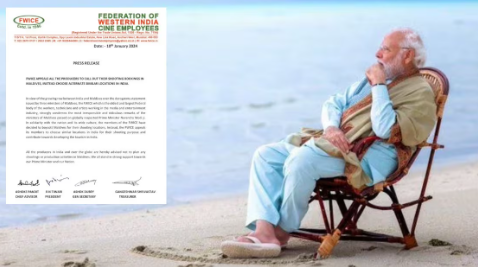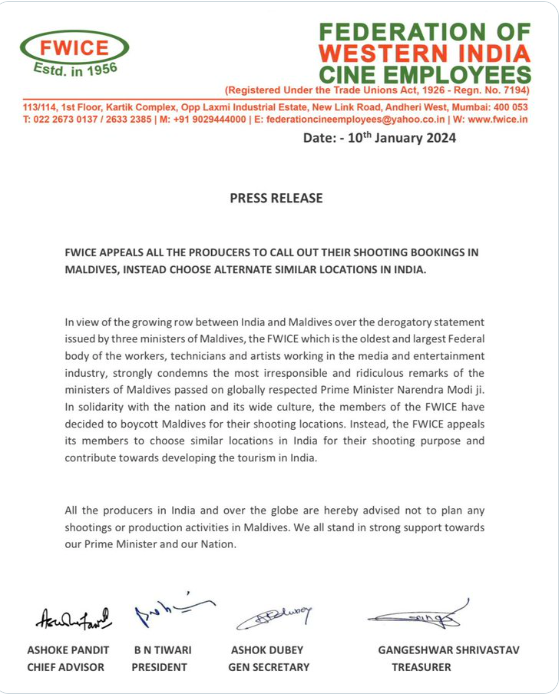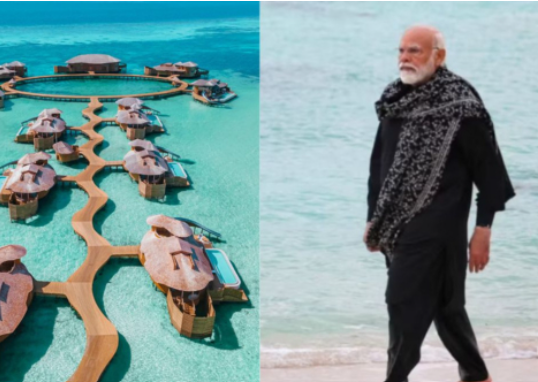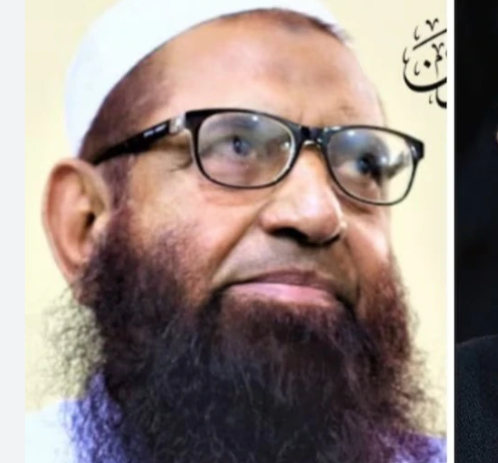
FWICE Strongly Recommends Filmmakers Avoid Maldives Shoots Amid Rising Tensions, Promotes Indian Locations Instead
FWICE Takes a Stand: Calls for Maldives Shoot Boycott Amidst Diplomatic Tensions
In a significant move, the Federation of Western India Cine Employees (FWICE) has taken a stance against the Maldives, urging filmmakers to boycott shoot locations in the island nation. This decision comes in the wake of derogatory remarks made by three ministers from the Maldives about Prime Minister Narendra Modi, which have sparked growing tension between the two nations.

In an official statement, FWICE, the oldest and largest federal body representing workers, technicians, and artists in the media and entertainment industry, strongly condemned the “irresponsible and ridiculous remarks” made by the Maldivian ministers. In a show of solidarity with Prime Minister Modi and the cultural values of the nation, FWICE members have collectively chosen to boycott the Maldives as a shooting destination. Instead, they encourage filmmakers to opt for “similar locations in India” and contribute to the development of tourism within the country.
The statement issued by FWICE reads, “All the producers in India and over the globe are hereby advised not to plan any shootings or production activities in Maldives. We all stand in strong support towards our Prime Minister and our Nation.” This call for a boycott reflects the film industry’s commitment to upholding national pride and unity in the face of perceived disrespect towards India’s leader.
This decision by FWICE follows a trend set by prominent personalities from the Maldives who mocked India and Prime Minister Narendra Modi’s recent visit to the Lakshadweep Islands. PM Modi shared images of his visit, showcasing the picturesque beauty of the Indian islands and participating in activities like snorkeling. The subsequent mocking by Maldivian figures triggered a strong reaction within the Indian film industry.
Notable Indian celebrities, known for their frequent visits to the Maldives, have joined the movement to promote Indian islands as alternative shoot locations. Personalities such as Salman Khan, Akshay Kumar, and Shraddha Kapoor have not only shown support for the boycott of Maldives shoots but have actively encouraged exploring and appreciating the beauty of Indian islands, particularly highlighting Lakshadweep.
Akshay Kumar, in a social media post, expressed his surprise at the “hateful and racist comments” directed at Indians by prominent figures from the Maldives. He emphasized the need to stand against unprovoked hate and called for supporting India’s own tourism by deciding to “#ExploreIndianIslands.” Kumar, who has visited the Maldives multiple times, stressed the importance of dignity and encouraged a collective effort to bolster Indian tourism.
The FWICE’s call for a boycott aligns with the broader sentiment within the Indian film industry, advocating for national pride and unity. The move also signifies a shift in focus towards exploring and promoting the diverse and enchanting landscapes that India has to offer for film shoots, underlining the industry’s commitment to the nation’s values and cultural heritage.
As filmmakers reconsider their shoot locations and celebrities actively endorse the exploration of Indian islands, this incident serves as a reminder of the influence wielded by the entertainment industry in shaping perceptions and supporting national interests. The FWICE’s decision underscores the industry’s role beyond entertainment – as a voice that can resonate and influence for the greater good.

The call for a boycott of Maldives shoots by FWICE has sparked discussions within the film industry about the broader implications of such decisions on diplomatic and cultural relations. The entertainment industry, often seen as a cultural ambassador, is now at the center of a discourse that goes beyond the cinematic realm.
The FWICE’s stance against the Maldives is not merely a reaction to disparaging comments; it reflects a growing trend of Bollywood celebrities actively engaging in socio-political conversations and taking a stand on issues that resonate with national sentiments. This shift is indicative of the industry’s recognition of its influence and responsibility to contribute positively to societal narratives.
As the Indian film fraternity rallies behind the call to explore and promote Indian islands, it raises questions about the impact of celebrity endorsements on travel and tourism. The power of influencers, including Bollywood stars, in shaping public perceptions and preferences is undeniable. The #ExploreIndianIslands movement initiated by Akshay Kumar and supported by others might have a considerable impact on where people choose to travel and explore.
Moreover, the FWICE’s notice urging producers to avoid Maldives for shootings could potentially influence global film production trends. The industry’s decision to collectively take a stand against what it perceives as disrespect towards the Indian Prime Minister sets a precedent for leveraging its economic clout to advocate for national interests.
This incident also sheds light on the intricate relationship between the entertainment industry and political diplomacy. As films and celebrities have a significant reach and influence, their actions can inadvertently become part of diplomatic narratives. The boycott of Maldives shoots, in this context, becomes a symbol of resistance and assertion of national pride through the lens of the entertainment industry.

However, such decisions also carry risks, including potential backlash and strain on diplomatic ties. The delicate balance between expressing solidarity and unintentionally escalating tensions underscores the need for thoughtful and nuanced approaches when the entertainment industry engages with geopolitical issues.
As the situation evolves, it will be interesting to observe how the film industry’s stance on the Maldives influences not only shooting location choices but also broader conversations about the responsibility of celebrities as influencers. The incident has opened a dialogue about the role of the entertainment industry in shaping public opinion, contributing to national narratives, and influencing cultural diplomacy.
In conclusion, the FWICE’s call for a boycott of Maldives shoots represents a significant moment where the Indian film industry steps beyond its traditional boundaries to assert its influence in the realm of politics and diplomacy. The broader implications of such decisions, both within the industry and on the global stage, warrant continued attention as the intersection of entertainment, politics, and cultural relations continues to evolve.
For the latest updates-click here.


